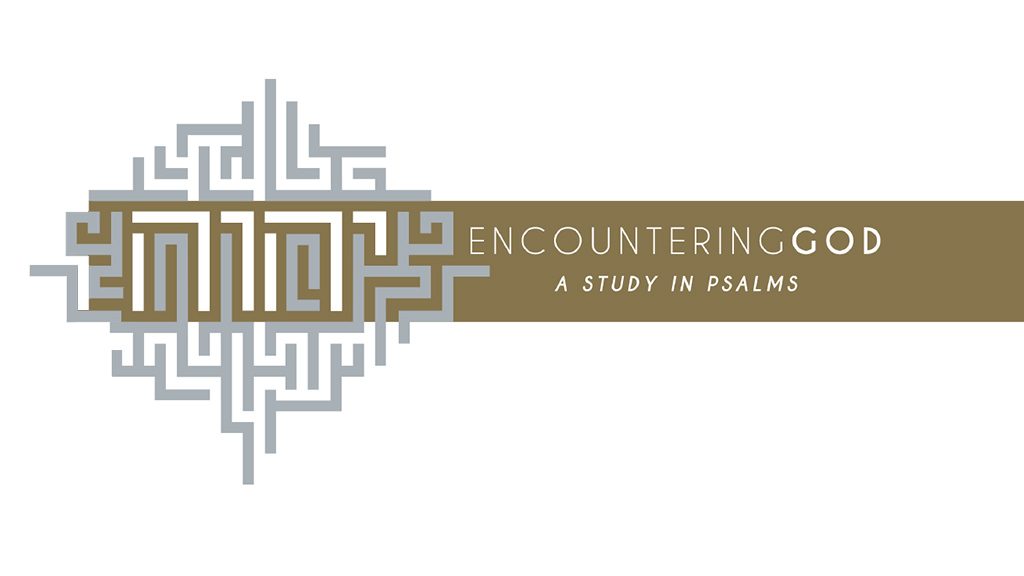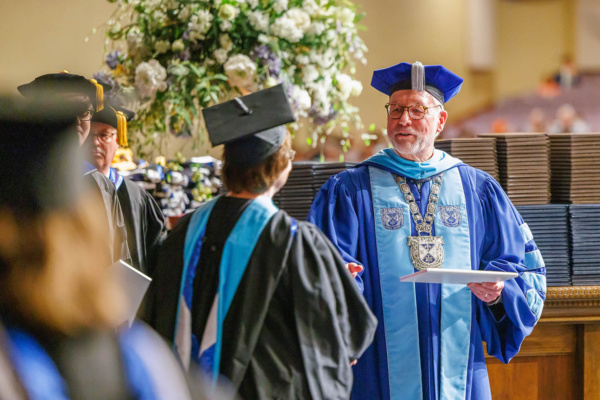In his famous dissertation The End for Which God Created the World, Jonathan Edwards, the great American theologian, proclaimed that God’s ultimate end is the manifestation of His glory. This glory is God’s unique excellence—the totality of His intrinsic perfections on display. We cannot pursue life’s ultimate purpose until we realize God created us to discover and declare His glory (1 Cor. 10:31).
The theme of Psalm 19 is the glory of God displayed through the world He created (19:1–6) and the Word He spoke (19:7–14)—or through what we call natural and special revelation.
God’s Glory Is Declared Through His World
Psalm 19:1
The heavens declare the glory of God; and the firmament sheweth his handywork.
David begins by asserting that all of creation displays the glory of God. The entire heavenly panorama—the sun, stars and planets—is telling the story of His glory. The vast expanse of creation is the work of His skillful hands. All nature shouts that God is divine, all-powerful, and all-wise.
Psalm 19:2–3
Day unto day uttereth speech, and night unto night sheweth knowledge. There is no speech nor language, where their voice is not heard.
Every hour of every day God’s message gushes forth like a mighty spring of water. Volumes are being communicated 24/7 about the knowledge of God. There is no language on earth that doesn’t hear God’s voice. He is not silent! If anyone claims to be an atheist, it is because he is deaf to the voice of creation.
Nevertheless he left not himself without witness, in that he did good, and gave us rain from heaven, and fruitful seasons, filling our hearts with food and gladness. (Acts 14:17)
Psalm 19:4–6
Their line is gone out through all the earth, and their words to the end of the world. In them hath he set a tabernacle for the sun, which is as a bridegroom coming out of his chamber, and rejoiceth as a strong man to run a race. His going forth is from the end of the heaven, and his circuit unto the ends of it: and there is nothing hid from the heat thereof.
David uses the sun to illustrate how nature reveals God’s wisdom. The psalmist describes the heavens above the earth as a huge tent with the sun lighting the space like a torch. When the sun rises in the morning, its radiant brilliance is like a bridegroom who comes out of his tent beaming with happiness. And when the sun moves in its circuit around the earth, it is like an Olympic winner who enjoys running his course.
By pointing to the sun as God’s creative handiwork, David also dismantles the idol worship of the day represented in the sun gods.
God’s Glory Is Declared Through His Word
We can know that God exists through creation, but general revelation is insufficient for knowing the fullness of God’s character. It is only through Scripture that we are able to more fully comprehend the nature of God.
In Psalm 19:7–9 David gives us, as described by Spurgeon, “six descriptive titles of the word, six characteristic qualities mentioned and six divine effects declared.”[1] It is as if David picks up a diamond, turns in six different ways, and expresses the brilliance of each facet.
Psalm 19:7
The law of the Lord is perfect, converting the soul:
The Hebrew word for law is torah. It refers to the first five books of the Old Testament (Genesis through Deuteronomy). However, it doesn’t refer merely to laws, but rather to the doctrine or teaching of these books. The law is sufficient (“perfect”) for all the needs of the spiritual life of God’s children and is effective to turn back and restore (“converting”) us when we sin and stray from God.
Psalm 19:7
The testimony of the Lord is sure, making wise the simple.
A testimony is a principle found in the law that requires obedience and serves as a warning if not kept. These regulations are right and reliable. The Bible’s narratives consistently show what happens when people obey and disobey God. God gave these testimonies to guide the young and naïve into all wisdom concerning righteous living.
Psalm 19:8
The statutes of the Lord are right, rejoicing the heart:
When a doctor gives you the right medicine to deal with your sickness, it makes you happy. In an even more important way, God’s precepts are medicine for our souls. They are right for us and bring joy and happiness when followed.
Thy words were found, and I did eat them; and thy word was unto me the joy and rejoicing of mine heart. (Jer. 15:16)
Psalm 19:8
The commandment of the Lord is pure, enlightening the eye.
God’s commands are pure, directing our lives morally and doctrinally into the light of God. Otherwise, we stumble along in darkness. As the psalmist prayed, “Thy word is a lamp unto my feet, and a light unto my path” (Ps. 119:105).
Psalm 19:9
The fear of the Lord is clean, enduring for ever:
When we spend time in the Word of God, it creates within us a reverential respect for God and a hatred for sin. This attitude toward sin is not hopelessly old-fashioned but eternally relevant for all people in all times.
Psalm 19:9
The judgments of the Lord are true and righteous altogether.
God’s declarations about what is right and wrong are reliable and trustworthy. You can build your life on all the divine standards of the Scriptures.
Psalm 19:10–11
More to be desired are they than gold, yea, than much fine gold: sweeter also than honey and the honeycomb. Moreover by them is thy servant warned: and in keeping of them there is great reward.
David ends this section by stating the immeasurable value of the Word of God. As we feed on God’s truth, we discover that our souls are satisfied and delighted. It’s like having the sweet taste of honey perpetually in our mouths. As we dig into God’s truth, we find that what we are mining is pure gold. The Bible enriches those who engage in learning it. God’s Word also protects us by admonishing us to avoid the destructive pathways of sin. Finally, God promises abundant, rewarding consequences if we strive to keep His Word by preserving, protecting and obeying it.
Conclusion
David’s conclusion to Psalm 19 links back to its introduction—God’s perfections have been put on display. He concludes with His desire to conform to that glory. David turns his eyes from the world and the Word back to himself. Suddenly he becomes acutely aware of his own sinfulness. In light of this astonishing knowledge of God, David realizes what little knowledge he has of himself.
So the psalm concludes with a penetrating question and an earnest prayer.
Psalm 19:12
Who can understand his errors?
Can anyone really comprehend God’s glorious perfections? Can anyone truly discern his own mistakes in the light of his ignorance of God’s glory? The starting point of conforming to God’s glory is answering David’s question with humility.
Psalm 19:12
Cleanse thou me from secret faults.
When we properly view ourselves in light of God’s perfections, we are awakened to the reality that we cannot hide our secrets. God knows, God comprehends, and God judges everything about us. So our earnest prayer should be for a deep cleansing of our own internal spiritual toxins.
Psalm 19:13
Keep back thy servant also from presumptuous sins; let them not have dominion over me.
Knowing ourselves should also lead to fearing ourselves, just as Paul cried out, “O, wretched man that I am” (Rom. 7:24). We must depend on God to protect us from ourselves! Knowing our flesh is weak, even when our spirit is willing (Matt. 26:41), we should echo what Christ taught us to pray, “Lead us [me] not into temptation, but deliver us [me] from evil” (Matt. 6:13).
Presumptuous sins are rooted in pride. The viewpoint of our flesh is “I can handle this.” Self-reliance causes many failures. Therefore, our greatest protection from sin is humility before God.
Psalm 19:14
Let the words of my mouth, and the meditations of my heart, be acceptable in thy sight, O Lord, my strength, and my redeemer.
David’s earnest prayer is for internal spiritual transparency before God. Hypocrisy is the religious man’s favorite sin. It is disingenuous to live one way before man and another way before God. David was passionate about living sincerely before God. He prayed that his verbal communications and internal meditations would be pleasing in God’s sight!
In the end this would not be possible without God’s being our strength (rock), our deliverer and restorer (Redeemer).
[1] C.H. Spurgeon, The Treasury of David (Peabody, MA: Hendrickson Publishers, 1988), 1:272.
Listen to Dr. Pettit’s chapel message on Psalm 19:
Join us for chapel every Monday through Thursday at 11 a.m. EST.








